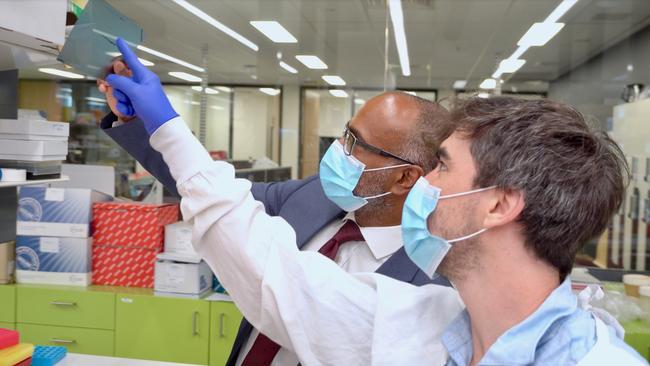Professor Mark Dawson wins Prime Minister’s Prize for Science for blood cancer treatment
An Australian professor responsible for revolutionising blood cancer treatments has been awarded the Prime Minister’s prestigious annual top science prize.
Health
Don't miss out on the headlines from Health. Followed categories will be added to My News.
Professor Mark Dawson couldn’t understand why some of his patients with identical cancers responded differently to the same cancer treatment.
His frustration led him back to the lab – which not only resulted in the development of new lifesaving drugs – but being awarded the prestigious Frank Fenner Prize for Life Scientist of the Year.
“Patients with essentially what looks like exactly the same cancer, we give them the same treatment and one gets cured and the other patient gets no benefit,” Professor Dawson from the Peter McCallum Cancer Centre told News Corp Australia.
“To understand that I had to understand that difference at a molecular level, and to do that I needed to train as a scientist,” Prof Dawson said.

His work in the science lab led to groundbreaking discoveries within human genes that have revolutionised the treatment of blood cancers.
He has developed two new treatments for cancer called BET inhibitors that are currently in human clinical trials in combination with other cancer therapies with results due to be published soon.
Cancer cells evade the immune system by shutting off genes that the immune cells would normally recognise on the cell surface.
These new drugs turn these genes back on making the cancer cell visible to the immune system.
“In some patients we see remarkable benefits but in some patients, there’s no benefit,” he said.
Professor Dawson explains his research using the analogy of caterpillar becoming a butterfly.
Both carry exactly the same DNA sequence yet have markedly different physical states.
This is because the genes that are expressed in the caterpillar are different to the genes that are expressed in the butterfly.
“Epigenetics can be summarised as the processes that are in place that regulate access to a DNA sequence to express the right genes, at the right place at the right time,” he said.

In humans, every one of our cells has the same DNA sequence but the skin cell does a very different job to a blood cell.
“What we’ve learned over the last 10 years is that, in cancer this process is corrupted and cancer cells start to add normally expressed genes that should not be expressed in that particular cell and they grow out of control,” he said.
Other scientists around the world are working on a handful of other BET inhibitors and they are being trialled on around 30 different types of cancers.
Studies have found on their own they have limited effectiveness but when they are used in combination with other cancer medications they work better.
Professor Dawson was one of 10 to be awarded the Prime Minister’s Prize for Science with others including a team of four Australian scientists who contributed to the discovery of gravitational waves – Emeritus Professor David Blair (University of Western Australia), Professor David McClelland (Australian National University), Professor Susan Scott (Australian National University) and Professor Peter Veitch (University of Adelaide).
This group was awarded the Prime Minister’s Prize for Science for their work using Einstein’s Theory of Relativity to create a ‘bionic ear’ that allows us to listen to everything that has ever happened in the universe. Now their ambition is to listen and find out what really happened at the beginning of time.
The Malcolm McIntosh Prize for Physical Scientist of the Year went to Scientia Associate Professor Xiaojing Hao (UNSW) who was recognised for her research into solar cells made from ‘sulphide kesterite’ which are changing the way we produce renewable solar energy.
Associate Professor Justin Chalker from the Flinders Institute for Nanoscale Science and Technology won an award for inventing a new class of polymers that can remove mercury contamination and resolving oil spillages.
The Prime Minister’s Prize for Excellence in Science Teaching in Primary Schools went to Mrs Sarah Fletcher from Bonython Primary School in the ACT.
The Prime Minister’s Prize for Excellence in Science Teaching in Secondary Schools was awarded to Mr Darren Hamley from Willetton Senior High School in Western Australia.
READ MORE:
Foods you should eat to control deadly allergies
Ex-horror aged care home boss awarded $920,000 contract
Originally published as Professor Mark Dawson wins Prime Minister’s Prize for Science for blood cancer treatment

